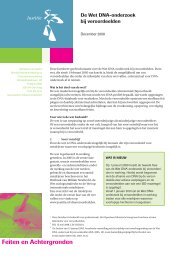INTERPOL HANDBOOK ON DNA DATA EXCHANGE AND PRACTICE
INTERPOL HANDBOOK ON DNA DATA EXCHANGE AND PRACTICE
INTERPOL HANDBOOK ON DNA DATA EXCHANGE AND PRACTICE
You also want an ePaper? Increase the reach of your titles
YUMPU automatically turns print PDFs into web optimized ePapers that Google loves.
It is not only the individual who is involved in a crime or investigation who may beaffected by discrimination due to results from <strong>DNA</strong> tests. The family members of theindividual may also be at risk. This is due to the similarities that exist in the geneticmake-up of family members. The <strong>DNA</strong> of an individual can reveal his personal andfamily disposition to illness and disease. Discrimination on the grounds of geneticpredisposition to diseases, temperament, and many other traits determined by our<strong>DNA</strong>, often gives cause for concern. There is potential for links to be made betweena profile obtained at a crime scene and a family member of the perpetrator who hasalready been convicted, making it possible for families to feel unfairly targeted. Thesefactors can affect the public’s confidence in a national <strong>DNA</strong> Database and give rise toconcern.A major social concern is linked to the health-related information that can be determinedfrom <strong>DNA</strong>; disclosure of this kind of information can make an individual feel vulnerableto discrimination in employment, education, insurance and other contexts. Use ofinformation that relates to an individual’s health predisposition by insurers when fixinginsurance rates would stigmatize and discriminate against individuals in society. Withmany aspects of health, <strong>DNA</strong> is not the only contributing factor, so an individual mighteven feel forced to undergo health checks and prove the absence of the illness so as toavoid such discrimination. This treatment could result in mental agony and financial lossalongside unfair stigmatization.Whilst bearing in mind the possible misuse of <strong>DNA</strong> data for the harassment of anindividual, it is essential that every effort is made to ensure that the genetic data ishandled within the framework of international conventions and declarations. The geneticdata should be safeguarded and protected to prevent its use as a tool for discriminationby employers, insurers, and so forth. Similarly, efforts should be made to ensure that<strong>DNA</strong> data is not misused for purposes of discrimination and categorization.•addressing privacy and data protection concernsLaw-enforcement agencies and other relevant authorities should aim to protectindividuals’ genetic data. Standardization of procedures that concern the collecting,processing, utilizing and accessing of the genetic data should be a high priority. All effortsshould be made within international standards to ensure fairness, and transparencyand integrity of the <strong>DNA</strong> information collected and stored by the law-enforcementagencies.To effectively prevent the misuse of <strong>DNA</strong> information for unauthorized purposes itis important to educate all personnel involved in the collection and storage of <strong>DNA</strong>data. This will ensure that at each stage everyone involved with the data is awareof the privacy and safety provisions of the law and will subsequently help improvethe protection of innocent individuals. Protecting the public’s right to privacy is ofparamount importance.PRIVACY <strong>AND</strong> <strong>DATA</strong> PROTECTI<strong>ON</strong> PAGE 65







